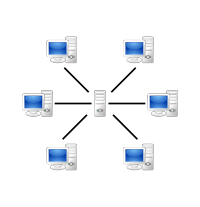P2PTV
Peer-to-Peer-TV ( English. Peer , “equal”) or P2PTV for short is a term for television over the Internet, which happens over a peer-to-peer network, in which all participants the received video - Make streams available to others at the same time.
In classic broadcasting, there is a central transmission entity that supplies many recipients with the same content ( multicast ), although it is not intended that the recipients communicate with the transmitter on a large scale. In other words: the flow of information only goes in one direction - i.e. unidirectional - from the sender to the recipient.
P2PTV, on the other hand, is based on a return channel capable, as synchronous as possible IP distribution network. A client (receiver) can also act as a server (sender) through the return channel, which regularly enables an extensive flow of information also from the recipient . Each participant in the network functions as a receiver and sender at the same time. The advantage for broadcast content providers is that they hardly have to provide their own server capacity.
P2P-Next is a research project of the European Union that deals with technical and legal issues relating to the distribution of television via Internet peer-to-peer networks.
P2PTV application programs
- Alluvium
- Babelgum
- Bit torrent
- CoolStreaming
- Cybersky TV
- Feidian
- Joost
- KeyHoleTV from the Japanese Ministry of Internal Affairs and Communications
- Live station
- Miro
- Octoshape
- OnLineLive
- PeerCast
- PPLive
- PPStream
- ReelTime.com
- SopCast
- TVants
- TVUPlayer
- Vuze
- Wivi
- Zattoo
References
Individual evidence
- ↑ EU funds project on Peer-to-Peer Internet TV http://derstandard.at/?url=/?id=3232573
- ↑ http://www.fuzo-archiv.at/artikel/174342v2 BitTorrent lends films over the net

